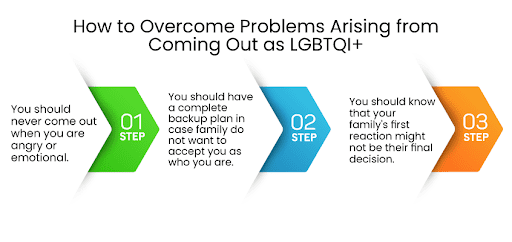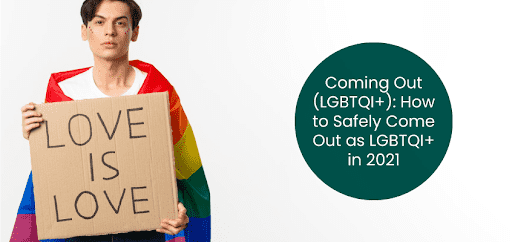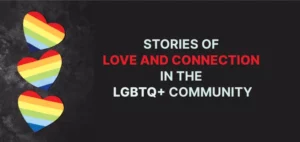Introduction
Coming out as LGBTQI+ or coming out of the closet refers to self-disclosing or sharing your gender or sexual identity/orientation with others. Before doing so, you must learn to value your gender and sexual orientation. The reason for coming out as LGBTQI+ should never be societal or peer pressure; it should be self-expression, self-satisfaction, and the need to declare your true identity.
What Does Coming out as LGBTQI+ Mean?
Coming out as LGBTQI+ (Lesbian, Gay, Bisexual, Transgender, Queer, Intersex, and others) is the process through which you can understand, accept, and disclose your true gender identity or sexual orientation. It means valuing yourself as who you indeed are and sharing your identity with others without any guilt or fear.
The initial step involves self-realization or coming out to yourself. Self-acceptance is a big challenge in a prejudiced society that discriminates against you based on who you are and what love is. Before coming out, you must understand whether you are lesbian, gay, bisexual, transgender, intersex, or belong to the queer spectrum of gender and sexual orientation.
You are coming out as LGBTQI+ is difficult in a stereotypical society. The organization makes you believe you should be heterosexual and behave as culture defines your gender or sexual orientation. If you are gay, lesbian, bisexual, transgender, intersex – basically, anyone who is queer, i.e., not heterosexual (‘straight’) and cisgender – you are different and do not form a part of society. Such a situation might make you feel afraid and isolated. When you come out of the closet, you get to mix with many people who are just like you.
Why Do People Come Out as LGBTQI+?
People come out to feel liberation and inner peace in their true gender/sexual identity. You might suffer an identity crisis if you remain in the closet and experience a sense of denial. Although it might take time to come out, the eventual result is peaceful and fulfilling.
- Coming out allows you to live your life according to your terms, making you more honest with yourself.
- It boosts your self-esteem.
- You don’t have to hide your true identity.
- You might no longer feel isolated because you are likely to connect with other friends belonging to and members of the LGBTQI+ community when you come out.
Some Tips for Coming Out as LGBTQI+
It feels good to come out, but you should not hurry. It would be best if you gave yourself the time it takes to feel ready to share your true self with the world. Here are some tips for this process:
- Be patient – try not to hurry to tell everyone at once. Take your time.
- Never put yourself under any pressure. Just relax and come out when you feel like it.
- It would be best if you were judicious in choosing the people you want to disclose your true identity. Talk to a friend or family member you trust and believe will understand your point of view and support you.
- It would be best if you never came out when you were angry.
- Try to develop a network of friends who will support and accept you for who you are.
The Relation between Mental Health and Coming Out as LGBTQ+
It is obvious the relation between mental health and coming out as LGBTQI+. When you cannot live under your real identity and disclose it to anyone, you are constantly under pressure to hide it. You cannot act like your authentic self. When you eventually come out, you might feel self-liberated, but you might also have to face the harsh side of society.
Society has many negative, ingrained prejudices against people who belong to the LGBTQI+ community. Therefore, LGBTQI+ people are often affected by and fear coming out. Due to this societal prejudice, members of the LGBTQI+ community often have mental health issues, the highest being the transgender and bisexual communities. Mental health hampers from the constant fear and exposure to shame, fear, and discrimination resulting from coming out.
How to Overcome Problems Arising from Coming Out as LGBTQI+

You can overcome problems arising from coming out by following some tips:
- It would be best if you never came out when you were angry or emotional; your family or friend circle might be more welcoming when you are calm while announcing your identity.
- Sometimes your family or friends might react after you come out. Therefore, you should have a complete backup plan in case they do not want to accept you as who you are.
- Your family snow that your family’s first reaction might not be their final decision, and they might be in shock or not know how to react. Hence, you have to stay calm. Eventually, most families accept their loved ones.
- Coming out may not be an easy process. So in many cases, professional help and support from a counsellor or therapist are beneficial in recognizing your LGBTQ identity, as it can be confusing and overwhelming sometimes.
Conclusion
You have to understand that coming out as LGBTQI+ is a lengthy process, and it might even take a lifetime to come to terms with your identity and make others realize the truth about yourself. For many communities, it might take a lot of time to accept the members of the LGBTQI+ community wholeheartedly. Therefore, if you feel unsafe at any point, avoiding going through with the coming out is alright.
No one has the right to share your identity without your permission. Therefore, although coming out might liberate you, it is alright if you take the time to come out. Your mental and physical health is of utmost priority, and you shoeither’sr come out at either expense.





